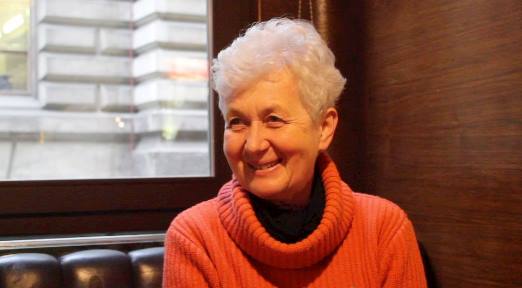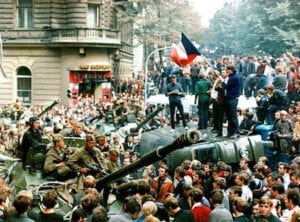The Velvet Revolution: A Freedom of Soul

 “Our possibilities were cut. We had money, we hadn’t hunger, but we hadn’t freedom of soul.”
“Our possibilities were cut. We had money, we hadn’t hunger, but we hadn’t freedom of soul.”
For someone who was born into the communist regime, it never seemed so bad. Eva Přenosilová, a lifelong Prague resident, was able to live what she considered a normal life with her family.
Despite the government taking her father’s small design firm and their family home, she was able to live without “special problems” as she called them. Even without these problems, they were still under strict control of the Soviet Union.
Communism was brought into the former Czechoslovakia in 1948 after World War II. Under the control of the Soviet Union properties and businesses were taken, religion was banned and freedoms were stolen, according to Přenosilová.
Individuals were no longer allowed to own private businesses, travel abroad and were forced to attend communist functions. Not being able to go abroad affected Eva personally because she has a heart for travel.
“We were, we are, very keen that we can travel abroad,” said Přenosilová. “We spent three months in the United States.”
After 20 years of strict communist leadership, things began to shift in the 1960s as new Czech governance made adjustments to communist policies.
People were finally starting to regain hope. Czechs were hopeful not for the fall of communism but for a change in the way of the government. “In 1968 we were especially, all people, were full of hopes that things will better, that things will change,” said Přenosilová. But on August 20, 1968, the Czechs hope was crushed by the Soviet invasion on Czechoslovakia.
“The period between ’70s to Velvet Revolution was very gray period,” said Přenosilová. “Nothing special. People lived close to themselves.”

But after the fall of the Berlin wall on November 9, 1989, the people of Czechoslovakia had the courage to fight against communism. The revolution, lead by Václav Havel, started with a peace march on November 17, 1989, and ended with the presidency of Havel on December 29, 1989.
During this six-week period not a shot was fired, giving it the name the “Velvet” Revolution.
Eva still remembers the day her family heard the announcement of the end of the communist regime. “This day I remember was very strong day for most of people, and in our family we were very happy in that moment,”said Přenosilová.
When the Velvet Revolution finished in 1989 Eva was 43 years old. She was able to prove to the government that she had ownership of their family home, and it is currently where her daughter’s family lives today.
“What was very very good and we feel, and I still feel it, was a freedom of soul,” said Přenosilová.
Edited by Jessica Carr



